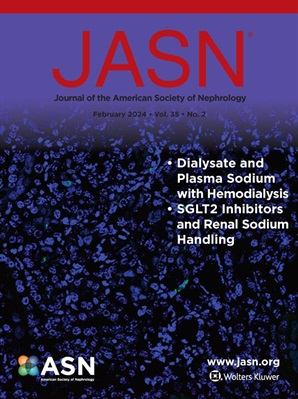红细胞ACKR1缺乏加重免疫介导的肾脏疾病
IF 9.4
1区 医学
Q1 UROLOGY & NEPHROLOGY
引用次数: 0
摘要
非典型趋化因子受体1 (ACKR1)基因的单核苷酸多态性编码人类达菲抗原血型。西非血统的大多数个体在ACKR1基因的启动子区域携带单核苷酸多态性,这种多态性会破坏其在红系细胞中的转录,而不会破坏其在静脉内皮细胞中的转录,导致“红系沉默”,即FyBES Duffy表型。方法采用两种红细胞选择性ACKR1缺失小鼠模型来描述该受体在红细胞室调节实验性免疫介导肾病发展中的基本作用。结果人源化的转基因Duffy红细胞沉默FyBESTG小鼠和移植ACKR1缺失骨髓的嵌合WT小鼠,在诱导肾毒性血清肾炎后,与各自的对照组相比,均表现出更高的疾病活动性和纤维化。缺乏红系ACKR1的小鼠表现出血清趋化因子水平的改变,骨髓单核细胞表现出活化和亲迁移表型。此外,它们显示肾脏浸润性巨噬细胞的增加,其特征是纤维化转录组特征。在伴有或不伴有肾毒性血清肾炎的红系ACKR1缺陷小鼠中,肾血管内皮细胞中ACKR1的表达未见变化。结论我们的数据表明,红细胞特异性ACKR1缺乏导致肾毒性血清肾炎中巨噬细胞浸润肾增加,并改变纤维化表型,导致肾脏疾病加重。本文章由计算机程序翻译,如有差异,请以英文原文为准。
Erythroid ACKR1 Deficiency Aggravates Immune-Mediated Kidney Disease.
BACKGROUND
Single nucleotide polymorphisms of the atypical chemokine receptor 1 (ACKR1) gene encode human Duffy Antigen blood groups. The majority of individuals of West African ancestry carry a single nucleotide polymorphism in the promoter region of the ACKR1 gene that disrupts its transcription in erythroid cells but not in venular endothelial cells, leading to an "erythroid-silent", FyBES Duffy phenotype.
METHODS
We used two mouse models of erythroid-selective ACKR1 deficiency to delineate the fundamental role of this receptor in the erythroid compartment in regulating the development of experimental immune-mediated kidney disease.
RESULTS
Humanized transgenic Duffy erythroid-silent FyBESTG mice and chimeric WT mice transplanted with ACKR1-deficient bone marrow, both selectively lacking erythroid ACKR1, showed increased disease activity and fibrosis after induction of nephrotoxic serum nephritis, as compared to their respective controls. Mice lacking erythroid ACKR1 exhibited altered serum chemokine levels and bone marrow monocytes displaying activated and pro-migratory phenotypes. Moreover, they showed an increase in kidney infiltrating macrophages that were characterized by a profibrotic transcriptome signature. No changes in ACKR1 expression in kidney vascular endothelial cells were seen in erythroid ACKR1-deficient mice with or without nephrotoxic serum nephritis.
CONCLUSIONS
Our data suggest that erythroid-specific ACKR1 deficiency leads to an increased infiltration of the kidney by macrophages with an altered profibrotic phenotype in nephrotoxic serum nephritis, resulting in aggravated kidney disease.
求助全文
通过发布文献求助,成功后即可免费获取论文全文。
去求助
来源期刊
CiteScore
22.40
自引率
2.90%
发文量
492
审稿时长
3-8 weeks
期刊介绍:
The Journal of the American Society of Nephrology (JASN) stands as the preeminent kidney journal globally, offering an exceptional synthesis of cutting-edge basic research, clinical epidemiology, meta-analysis, and relevant editorial content. Representing a comprehensive resource, JASN encompasses clinical research, editorials distilling key findings, perspectives, and timely reviews.
Editorials are skillfully crafted to elucidate the essential insights of the parent article, while JASN actively encourages the submission of Letters to the Editor discussing recently published articles. The reviews featured in JASN are consistently erudite and comprehensive, providing thorough coverage of respective fields. Since its inception in July 1990, JASN has been a monthly publication.
JASN publishes original research reports and editorial content across a spectrum of basic and clinical science relevant to the broad discipline of nephrology. Topics covered include renal cell biology, developmental biology of the kidney, genetics of kidney disease, cell and transport physiology, hemodynamics and vascular regulation, mechanisms of blood pressure regulation, renal immunology, kidney pathology, pathophysiology of kidney diseases, nephrolithiasis, clinical nephrology (including dialysis and transplantation), and hypertension. Furthermore, articles addressing healthcare policy and care delivery issues relevant to nephrology are warmly welcomed.

 求助内容:
求助内容: 应助结果提醒方式:
应助结果提醒方式:


